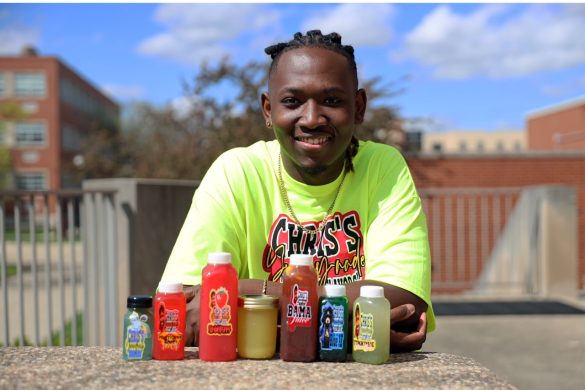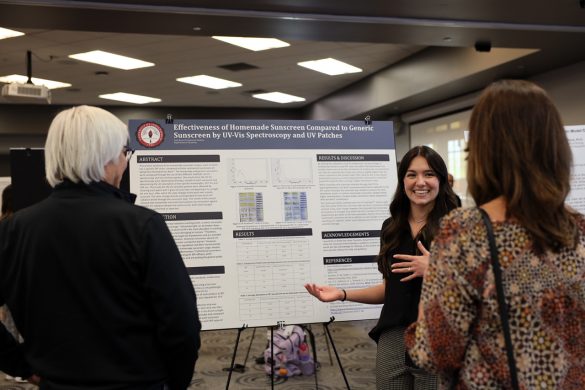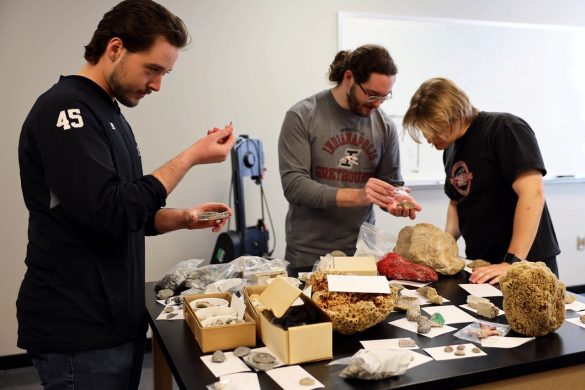“Everybody makes mistakes. We don’t all have the good fortune of being pious and holy, in spite of how much some might like to believe they may be. However, not everybody decides to participate in a bank robbery.”
This is one of the passages in 29-year-old senior math major Joshua Track’s essay for his ENGL 310: Creative Nonfiction course. The essay documents how at age 19, Track became a bank robber. It was through this essay that his classmates and professor, Assistant Professor of Creative Writing and American Literature Kip Robisch, learned that Track is an ex-convict.
“Honestly, most people don’t know,” Track said. “I don’t bring it up that often. I brought it up in Kip’s class last semester because of a creative nonfiction essay that I wrote because … it was high on the list of things that have affected me in my life.”
The Crime
According to Track, 2005 is where the story begins. Track was living with his parents and little sister at the time. After he graduated from high school, he began working at Admiral Petroleum, on the third shift, in Elkhart, Ind. Track said that eventually he was promoted to general manager of the gas station.

Senior math major Joshua Track writes an equation on the board. Track was convicted of bank robbery in 2006 while living in Elkhart, Ind. Photo by Mercadees Hempel
“I was making decent money. I had solid income, and I didn’t have anything beyond a high school education,” Track said. “So I was doing pretty well for myself. And I lost that job as a result of some bad accounting.”
Track said that many people were getting laid off around this time and not many businesses were hiring, either. Without work, he said, he really needed money, because he was supporting his father’s drug addiction. And at the time, he also believed his dad had cancer.
“I was essentially supporting my dad’s drug habit because … he told me he was dying of cancer, which I later found out he wasn’t,” Track said. “He’s dead now. Ironically enough, he died of cancer…. At the time, he had never lied to me before. So I didn’t have a reason not to believe him. So after I lost my job, he ran up a massive debt with a drug dealer whom I had been paying with my consistent work to keep him level.”
According to Track, the drug dealer was willing to give his father drugs without receiving the money for them right away, because Track had always made sure to pay him later. But after Track lost his job, he could not keep up with the payments anymore.
“So I had to do something,” Track said.
He said that he knew the inner workings of a bank. Track talked to a friend who, Track said, was in a similar financial situation, and Track had the idea to rob the KeyBank.
The bank robbery occurred on April 15, 2006. At 7:30 a.m., Track and his friend smoked crystal meth, and then around 9:30 a.m., they drove to the KeyBank in a throwaway car they had bought for around $300. Track said the point of the car was to get them there and get them back. Once at the bank, Track’s friend went in to get the money.
“Initially, I was going to be the one who went in to do the dirt,” Track said. “… But [my friend] was kind of insistent about it, so I drove.”
Track said that the bank robbery was nothing like how TV shows portray it or how Hollywood depicts it on the silver screen. He described it as “anticlimactic.”
“It was kind of low-key,” he said. “Pull up, walk in, grab the money, walk out in less than 30 seconds, and then done. That was it. That was the thing that led up to the big ugly that sent me down state.”
Track said the situation he was in was desperate enough not to be concerned with the consequences. But he was aware of them.
“I already knew what the consequences were…. At the time, it [robbery] was a Class B Felony, which carried a minimum of six years with mitigating circumstances,” he said. “At the time, I was on probation, so another six years on top of that. When I was charged, I pulled a couple [of] ‘gas and go’s,’ so they hit me with two Class D Felonies as well…. I was looking [at] around 30 years in prison.”
Track said that a week after the bank robbery, while intoxicated, he told a girl what had happened, and she filed a statement with the police. It took the police about five months to locate him, according to Track. While the police knew that Track had had an accomplice, he never gave up his friend’s name.
“Suffice to say, they never caught my friend. There really isn’t a point when you’re in a situation like this to go down with the ship,” he said. “There’s no reason to sink your crew if he’s already in a lifeboat out.”
The Sentence
After the police located Track and arrested him, he went through due process and was heard in a magistrate court. After being formally charged, Track was taken through the county system for each of his charges. In the end, he said, the city court dropped his violating probation charge. Track said that he spent 14 months in the county jail using resources such as the Indiana Rules of Trial that a friend of his gave him to build a case for himself. Track said county jail was an awful experience.
“…You have people detoxing off of drugs and cigarettes and stuff. Everyone’s in a really salty mood all the time. The turnover rate is really high because you have people who are coming in to do a month or something on public intoxication, [and] where you get another guy who’s looking at a life sentence for murder, who’s in transit to death row,” he said.
Near the end of the 14 months, Track said he had built up a good defense, but then the court came to him with a plea bargain. Track said they offered to drop the Class B Felony to a Class C Felony charge, which carries a minimum of two years and a maximum of eight years. The gas theft felonies also were dropped completely, and six years would be executed, including the good time he had served in the county jail. Track said that this meant he was only going to have to serve six years at most.
“The offer that they shot me was kind of too good to refuse, especially considering I did it,” Track said. “It’s one thing if you’re innocent, and you’re boxing everything up to go to trial like, ‘Oh, I’m going to see this through.’ But you know what, ‘I did it, and I’m probably not going to get a better deal than this, so let’s go ahead and take that.’… I signed off on it and went with it.”
In Prison
Track said that he accepted the plea agreement in September of 2006 and was taken to prison in November. He said that the most accurate portrayal he has seen of a prison is the Netflix original series of “Orange Is the New Black.” While Track has not been to women’s prison, he said that the way the bunks are set up and the way prisoners can move around freely in the facilities are very similar to that show. He said that everybody is not on lockdown all the time, and people are paired with people who have done similar crimes.
Track also said that not everybody is trying to rape and stab people while in prison, and that gangs would fight with other gangs and try to recruit people, but only once in a while.
“You get scared initially,” he said. “There’s shock. You get culture shock, like you don’t have your liberties. You have a set bedtime; you have a pretty set schedule…. Recreation facilities there are nice. You got interlibrary loan systems, so you get books from Indiana State University. If you’re doing enough time, you can go to college there.”
Track said that while in prison, he became a part of a vocational program about horticulture, which was taught by a former Purdue professor. Track said that the program condensed a four-year bachelor’s degree into a six-month program. Through this, Track attained horticulturist accreditation and received his pesticide applicator license. He also filled out his FAFSA while in prison and enjoyed running, reading and watching “Gossip Girl.” Track served two and a half years in prison and was released in March of 2009. Track said the scariest thing about prison is not the gangs, the guards, the other inmates or anything else people may think.
Track said, “I’m [going to] tell you the scariest thing about prison: It’s the easiest thing you’ll ever do. That’s why it’s scary—because once you go, you’re not really scared to go back.”
At UIndy
“Life afterwards [is the hardest part],” Track said, “because a lot of people are just kind of disillusioned with how the system as a whole works. They’re just like, ‘You know, when you go to jail, they just keep you there forever because everybody in America gets a life sentence.’ Like, no. People get out of jail eventually, and they have to go and live normal-people lives.”
Two weeks after being released, Track said he was able to get a job with a landscaping company, where he worked for four years. He also went on to receive his associate’s degree in liberal arts with a concentration in mathematics from Ivy Tech before applying to the University of Indianapolis to major in math. Track now lives downtown with his girlfriend, who is a research scientist and works at Indiana University.
During the fall semester of the 2015-2016 academic school year, Track took ENGL 310: Creative Nonfiction with Robisch. Robisch said that Track made an impression on him right away.
“He’s kind of a presence when he comes in because he’s not the same age as other students. He’s a returning student, so he stands out a bit in the crowd,” Robisch said. “So I tend to connect with somebody that way right away by asking questions and teasing a little bit to see just if this guy’s cool. Like I’m always curious about a returning student. Where did you come from? What did you do before now? I’m anticipating that he might have a few stories different than somebody who’s been on the common track when you get in a class. So immediately, of course, he uncorked with that sense of humor he’s got. He’s got a really great, sarcastic wit, so that came out right away. So I knew I’d like this guy. I knew he had stories to tell.”
Robisch said he wondered at first whether Track was telling the truth or being creative when he revealed through his essay that he was a bank robber. But after Track sent Robisch his mugshot and the police reports, Robisch knew the essay was authentic. Robisch said that Track also handled telling the class about his experiences with a lot of insight and maturity. Track said that the essay was praised, and that although not everybody at school has been accepting, his classmates in this class were.
“My essay was really well-received by the class,” Track said. “And also people were like, ‘I don’t really look at you any different. You’re still the same dude that was in here last week.’ So I don’t know. It might be different in a different class.”
Robisch said that he wants to help Track write his memoir about his experiences while he is still a student. Track is planning to be a fifth year senior, and Robisch said that they will have meetings to help get the memoir started and send out a treatment and sample chapters to a publisher.
“He’s got a pretty wide skill set. And this is where I’m getting to know the ripple effect [that] is on his life from having done it, how people see him,” Robisch said. “He’s got to go through this part of his life where he’s seen as the guy who robbed a bank. And there’s a part of him who doesn’t want anyone to know that, and there’s a part of him that wants everyone to know. And the memoir is a project where you sort of straddle that line because it’s not an autobiography where you tell all, and it’s not some tabloid story with the approach of romanticizing the whole thing…. He really has an amazing attitude about the whole thing. He’s a really smart guy.”
Robisch said that he believes Track’s story has potential as well, because everyone will want to know its outcome.
“Josh has an edge on the rest of us writers because he has a story that wants to be published. But we’re all looking for something that’s that interesting,” he said.
Track said that he does not have a set idea about what he wants to do after graduation, but he does enjoy writing and hopes to rise out of poverty by working.
“I’d love to write,” he said. “I guess you never really know until you just go and do it. But I have this really horrible fear of failure all the time because I’ve screwed up really bad a lot in my life, so I don’t know. I should be more willing to take risks, and I don’t think that anything will ever transpire from my writing if I don’t take it more seriously and give it the time that it needs, because a lot of people tell me that I’m a good writer.… When objective third parties tell you that your s—’s good, after never having any communication with you and not having a reason to lie to you, then the idea of it is a little more promising.”
Robisch said that he finds Track to be funny, with a wide range of talent in both English and math, and a great person to know as a student. He also said he has a great amount of respect for him. Robisch said that he does not think people should judge Track for what he has done and that Track is more than just a bank robber.
“When I did some of my work in ecological literary criticism, I talked to a lot of biologists and ecologists and people like that. And a lot of the biologists that I talked to, they really didn’t like defining predatory animals as predators,” Robisch said. “Like they’d say, ‘Is that animal a predator or not?’ And there’s kind of a vein of thought when it comes to biology, say… Is a person who eats hamburgers a burger eater? Is that the label you would hang on them? They are many things in a life. The predatory animal is not quintessentially, completely, 100 percent packaged as a predator.… These labels that we hang around people are labels that suit us more than they assert someone’s individuality.”
Track said the stigma that surrounds him as an ex-convict is frustrating to deal with, but that people should realize the harm it causes when they judge, and that people should help one another through the difficulty.
“I’ve got eight to 10 years between everybody here,” Track said. “I’ve seen some s—, and I’ve been a few places, and not everything is as black and white and cut and dried as it looks. There’s occasionally some ethical gray area that exists that can sometimes be difficult to navigate…. You don’t know how your decisions are going to affect someone else so … you never know how you’re going to have to pay your karma back or forward…. And that whole being judgmental of people and marginalizing people is not good, and a lot of people don’t realize they’re doing it. And it doesn’t just apply to the ‘cool’ ex-con guy. This is people of color and LGBT[QIA] community and other marginalized groups [who] get s— on constantly. I mean, if you’re not a minority, speak out for someone who is. That’s the best you can do. If somebody’s not making it, you got to do what you can to help them make it.”







